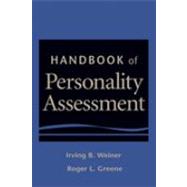
Note: Supplemental materials are not guaranteed with Rental or Used book purchases.
Purchase Benefits
What is included with this book?
Roger L. Greene is a professor at Pacific Graduate School of Psychology in Palo Alto, California, where he served as Director of Clinical Training for twelve years. Dr. Greene has worked in a variety of clinical settings and with different types of patients in his clinical career. His particular area of interest clinically is the assessment and treatment of alcohol and drug abuse. He has written a number of texts and articles on the use of the MMPI-2. His most recent book, The MMPI-2: An Interpretive Manual (2nd ed.) was published in 2000. His books on the MMPI/MMPI-2 have been among the standard references for over two decades. He is a Fellow of Division 12of APA and the Society for Personality Assessment. He has served on the Board of Trustees and as an Associate Editor of the Journal of Personality Assessment for the Society of Personality Assessment. His writings include numerous articles and chapters and the following books:
The MMPI: an Interpretive Manual, 1980
The MMPI-2/MMPI: An Interpretive Manual, 1991
Emerging Issues and Methods in Personality Assessment (Co-Ed.), 1997
The MMPI-2: An Interpretive Manual, 2000
| Preface | |
| Basic Considerations | |
| History of personality assessment | |
| Early Events | |
| Emergence of Personality Psychology | |
| World War II and the Expansion of Clinical Psychology | |
| Trends Over Time: Shrinkage and Growth | |
| Concluding Comments | |
| The personality assessment process | |
| Purposes of Personality Assessment | |
| Preparing for Personality Assessments | |
| Conducting Personality Assessments | |
| Interpreting Personality Assessment Data | |
| Reporting Personality Assessment Findings | |
| Psychometric Foundations Of Assessment | |
| Reliability | |
| Validity | |
| Clinical Decision Making | |
| Impediments to Accurate Decisions | |
| Concluding Comment | |
| Ethical considerations in personality assessment | |
| Student Disclosure of Personal Information | |
| Bases for Assessments | |
| Use of Assessments | |
| Informed Consent in Assessments | |
| Release of Test Data | |
| Interpreting Assessment Results | |
| Assessment by Unqualified Persons | |
| Obsolete Tests and Outdated Test Results | |
| Test Scoring and Interpretation Services | |
| Explaining Assessment Results | |
| Maintaining Test Security | |
| Training Students in Psychological Assessment | |
| Diversity | |
| Self-Report Inventories | |
| Overview of self-report inventories | |
| Nature of Self-Report Instruments | |
| Item Characteristics | |
| Methods of Scale Development | |
| Administration and Scoring | |
| Standardization Group | |
| Validity Assessment | |
| Interpretive Process | |
| Minnesota Multiphasic Personality Inventory | |
| History | |
| Administration | |
| Scoring | |
| Assessing Validity | |
| Interpretation | |
| Applications | |
| Psychometric Foundations | |
| Minnesota Multiphasic Personality Inventory-A | |
| History | |
| Administration | |
| Scoring | |
| Assessing Validity | |
| Interpretation | |
| Applications | |
| Psychometric Foundations | |
| Millon Clinical Multiaxial Inventory-III | |
| History | |
| Administration | |
| Scoring | |
| Assessing Validity | |
| Interpretation | |
| Applications | |
| Psychometric Foundations | |
| Personality Assessment Inventory | |
| History | |
| Administration | |
| Scoring | |
| Assessing Validity | |
| Interpretation | |
| Applications | |
| Psychometric Foundations | |
| NEO Personality Inventory-Revised | |
| History | |
| Administration | |
| Scoring | |
| Assessing Validity | |
| Interpretation | |
| Applications | |
| Psychometric Foundations | |
| Performance-Based Measures | |
| Rorschach Inkblot Method | |
| Nature of the Rorschach Inkblot Method | |
| History | |
| Administration | |
| Coding and Scoring | |
| Interpretation: Structural Variables | |
| Interpretation--Thematic Variables | |
| Interpretation--Card Pull | |
| Applications | |
| Psychometric Foundations | |
| Thematic Apperception Test | |
| Nature of the Thematic Apperception Test | |
| History | |
| Administration | |
| Coding | |
| Interpretation: Card Pull | |
| Interpretation: Story Meaning | |
| Applications | |
| Psychometric Foundations | |
| Figure drawing methods | |
| Nature and History of Figure Drawing Methods | |
| Administration and Scoring | |
| Interpre | |
| Table of Contents provided by Publisher. All Rights Reserved. |
The New copy of this book will include any supplemental materials advertised. Please check the title of the book to determine if it should include any access cards, study guides, lab manuals, CDs, etc.
The Used, Rental and eBook copies of this book are not guaranteed to include any supplemental materials. Typically, only the book itself is included. This is true even if the title states it includes any access cards, study guides, lab manuals, CDs, etc.